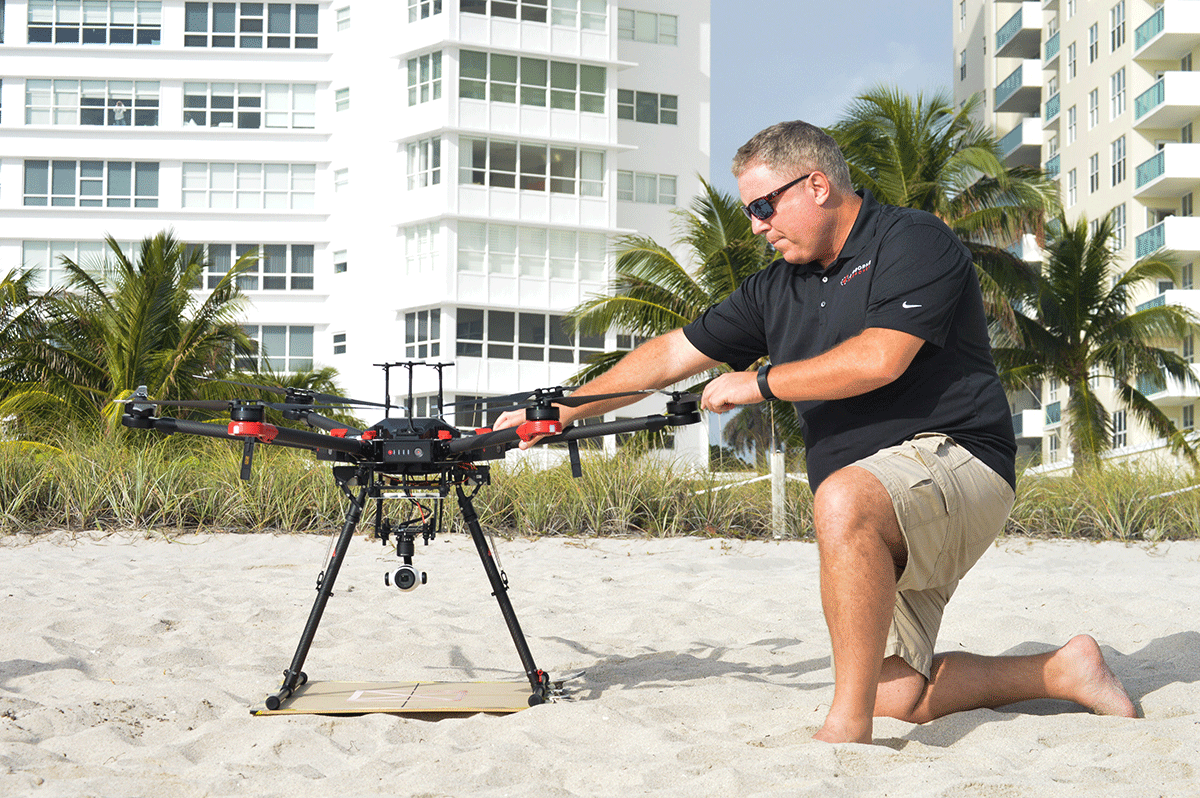
Christopher Todd at the Port of Miami
A few weeks ago I was contacted by Christopher Todd, the founder and CEO of
Airborne Response, a Miami-based UAV company that specializes emergency response and aerial security drone services.
We got together for coffee and I was immediately enthralled with Chris’ story about how he decided to abandon a promising career with Corporate America and dedicate his professional life to the world of drones. We set up a time for a formal interview and the rest is history.
Juan: Tell me how did you get to the world of drones?Chris: It all started with my degree in Advertising from Drake University and my various jobs in the advertising industry from Palm Beach to Milwaukee. Gradually, I began to discover “the Internet” and found the prospect of a connected world a fascinated concept. I then made every effort to get into it.
Juan: And that’s when you came to Florida?Chris: Exactly! I joined a Microsoft project by the name Sidewalk.com which was way ahead of its time and then worked for CBS SportsLine as Online Marketing Manager and in short, I had a nice progression of jobs related to the internet revolution from the late 90’s onward, it was fascinating to learn about this new world of constant communication. I was working in New York City as a technology analyst when the “Dot-Com Bubble” burst, so I moved back to Florida on September 1
st, 2001, just a few days before 9/11 and that really changed my life.

Preflight at the Port of Miami
Chris: After 9/11, I moved to Santo Domingo and worked as a consultant for a group launching an online poker site called PartPoker.com. That site quickly became the largest poker room in the world. We all did very well. Soon, I returned to Miami, pondering my next move. After working my way through the bustling nightlife scene of Miami Beach, I started volunteering for emergency response organizations in South Florida and gained a much greater appreciation for what these folks do for the community.
Juan: And the aviation component?Chris: Well, my ancestors arrived in what is now the U.S. in 1740, so I’m a 10
th generation American and we have a rich and long tradition with serving the nation. My great-grandfather was probably one of the earliest aviators in history, serving as a U.S. Army Air Corps pilot in WWI. There are other family members who served in military aviation – and the Navy – in WWII, so I’ve always been attracted to service, the sea, and the sky, even though I never actually learned to fly. I currently hold a USCG Master’s License for vessels up to 100 gross tons, as well as my Part 107 certificate, so you could say both aviation and the sea are in my blood.
Juan: When did you hear about drones for the first time?Chris: I believe it was in the late 2014 when I first started to realize that there was a huge difference between radio-controlled flying models and drones and so I began paying attention to news about the industry. One day everything clicked and I saw the opportunity to combine my passion for service with my love of technology -- but in this case unmanned aviation. I was there for the rise of the dot.com era and never thought I would see something like than happen again in my lifetime, but here we are. This new step in technology evolution offers completely trackable and measureable ROI. More importantly, it allows the other 99% of the world who has never been exposed to the benefits of aviation to start experiencing an entirely way to look at the world.
Juan: Tell me about your company, Airborne Response.Chris: I founded Airborne Response to create a platform for end users to explore how to introduce drone technology into their existing business processes to reduce operating costs, maximize efficiency and increase profits. We are mostly self-funded, but we also have financial support from a small group of angel investors.
 Juan: Any particular areas of interest or specialization for the company?
Juan: Any particular areas of interest or specialization for the company?Chris: We are very focused on our six areas of core competency which are: emergency response, cell tower inspections, beach erosion, security monitoring (in partnership with Altametry http://www.altametry.com/), mapping/survey and imagery capture. We also provide training and consulting services.
Juan: Where do you see the future areas of growth?Chris: Today we are forced to operate in the constrained environment of radio-controlled aircraft and visual line-of-sight (VLOS) regulations. This is comparable to using AOL dial-up Internet service in the late 1990’s. Most of us are out flying around in a virtual walled-garden dreaming of what is to come. Beyond VLOS will be like the broadband, persistent connectivity of today’s web. It is going to change the world much like high-speed mobile Internet service has reshaped our society. As soon as the FAA is able to “releases the hounds” and allow longer flights in controlled airspace and beyond visual line of sight, this industry will grow exponentially and the use cases in the various niche markets will multiply as far as the imagination allows.


 Juan: Any particular areas of interest or specialization for the company?Chris: We are very focused on our six areas of core competency which are: emergency response, cell tower inspections, beach erosion, security monitoring (in partnership with Altametry http://www.altametry.com/), mapping/survey and imagery capture. We also provide training and consulting services. Juan: Where do you see the future areas of growth?Chris: Today we are forced to operate in the constrained environment of radio-controlled aircraft and visual line-of-sight (VLOS) regulations. This is comparable to using AOL dial-up Internet service in the late 1990’s. Most of us are out flying around in a virtual walled-garden dreaming of what is to come. Beyond VLOS will be like the broadband, persistent connectivity of today’s web. It is going to change the world much like high-speed mobile Internet service has reshaped our society. As soon as the FAA is able to “releases the hounds” and allow longer flights in controlled airspace and beyond visual line of sight, this industry will grow exponentially and the use cases in the various niche markets will multiply as far as the imagination allows.
Juan: Any particular areas of interest or specialization for the company?Chris: We are very focused on our six areas of core competency which are: emergency response, cell tower inspections, beach erosion, security monitoring (in partnership with Altametry http://www.altametry.com/), mapping/survey and imagery capture. We also provide training and consulting services. Juan: Where do you see the future areas of growth?Chris: Today we are forced to operate in the constrained environment of radio-controlled aircraft and visual line-of-sight (VLOS) regulations. This is comparable to using AOL dial-up Internet service in the late 1990’s. Most of us are out flying around in a virtual walled-garden dreaming of what is to come. Beyond VLOS will be like the broadband, persistent connectivity of today’s web. It is going to change the world much like high-speed mobile Internet service has reshaped our society. As soon as the FAA is able to “releases the hounds” and allow longer flights in controlled airspace and beyond visual line of sight, this industry will grow exponentially and the use cases in the various niche markets will multiply as far as the imagination allows.
















Comments